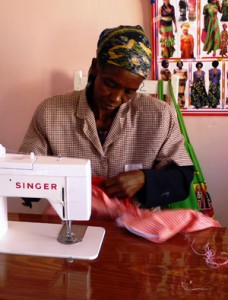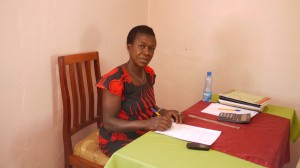Doreen is a bright student from Western Kenya. She passed all of her exams, but was unable to continue her education because she did not have any funds. Few women in her community are allowed to earn a living and save their money; the men control family funds, leaving the women with little economic power.
But today, there is hope for Regina, Doreen, and many other Kenyan women leaving similar situations.
 Both Regina and Doreen are now participating in empowerment programs facilitated by CWR partner Jitokeze Wamama Wafrika, an organization whose name in Swahili means, “Unveil yourself, women of Africa!” Regina and Doreen have developed tailoring skills which provide them an income as well as allow them to give back to their community by making and selling school uniforms to local families.
Both Regina and Doreen are now participating in empowerment programs facilitated by CWR partner Jitokeze Wamama Wafrika, an organization whose name in Swahili means, “Unveil yourself, women of Africa!” Regina and Doreen have developed tailoring skills which provide them an income as well as allow them to give back to their community by making and selling school uniforms to local families.
“Madame Lucy,” pictured below, is the Tailoring Program coordinator. This program not only provides the women with skills to earn a living, but also protects them against local oppression. While traditionally women are denied access to education, leaders like Madame Lucy inspire women of all ages to value their own knowledge, growth, and self worth.
 In addition to the Tailoring Program, Madame Lucy works with women to reduce food insecurity of local families. She leads women in keeping chickens; this practice both produces food for their families and ensures income security. The Kenya Agricultural Research Institute provides the initial investment of chickens. Those receiving chickens have spent three months training on poultry management. Because of significant investment in this program, the women now have access to a qualified veterinarian. The chickens receive vaccinations to prevent and control chicken diseases. The health of their poultry has improved drastically. This has led to healthier lives for women and their families.
In addition to the Tailoring Program, Madame Lucy works with women to reduce food insecurity of local families. She leads women in keeping chickens; this practice both produces food for their families and ensures income security. The Kenya Agricultural Research Institute provides the initial investment of chickens. Those receiving chickens have spent three months training on poultry management. Because of significant investment in this program, the women now have access to a qualified veterinarian. The chickens receive vaccinations to prevent and control chicken diseases. The health of their poultry has improved drastically. This has led to healthier lives for women and their families.


